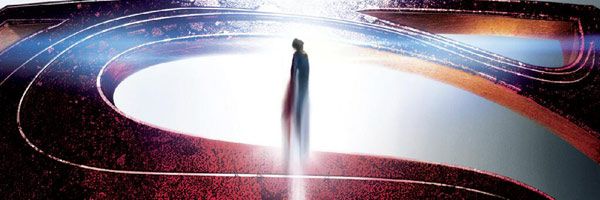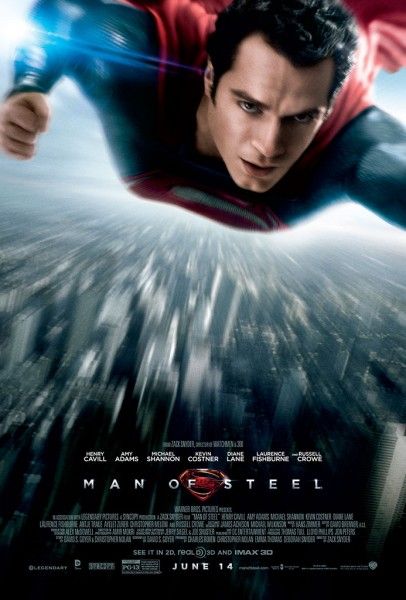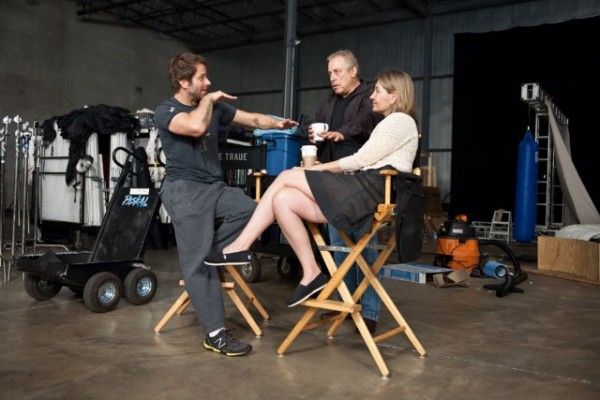One of the most highly anticipated summer blockbusters is Man of Steel, which takes the Superman story back to its origins, in a fresh and more grounded way. When the young Kal-El/Clark Kent (Henry Cavill) learns that he has extraordinary powers and is not of this Earth, he struggles with becoming the hero that he’s destined to be. From director Zack Snyder, screenwriter David S. Goyer and producer Christopher Nolan, the film also stars Amy Adams, Michael Shannon, Russell Crowe, Kevin Costner, Diane Lane and Laurence Fishburne.
During a press conference at the film’s junket, director Zack Snyder, screenwriter David S. Goyer and producers Deborah Snyder and Charles Roven talked about what led them to Zod, as a villain, why they decided to exclude Lex Luthor from this particular story, the challenges in taking on the Superman franchise, why they chose a non-linear narrative, and staying true to their vision. Check out what they had to say after the jump.
Question: Zack, in deciding what the structure of the movie was going to be and who was going to be the main opposing force, what was it about Zod that made you want to tell that story?
ZACK SNYDER: I think that the cool thing about Zod is that he offers a real physical and emotional threat to Superman that is much stronger than any earth-bound threat. He’s able to not only match him physically, but he also represents his people. He’s a hard opponent, that way.
Was it important for Zod to have a real reason for doing what he was doing?
ZACK: Absolutely, yeah! Michael [Shannon] and I talked, right at the beginning, about how we wanted Zod’s point of view to be pretty clear. If this was happening to your planet and you were trying to save the people that you loved, what lengths would you go to?
Why did you decide to exclude Lex Luthor from this story?
ZACK: There’s the Kryptonite question, too, that floats around the Lex Luthor question. Someone said, “Well, there’s no Kryptonite and no Lex Luthor.” Within the parameters of this story, there’s no Kryptonite or Lex Luthor, but that’s not to say that they don’t exist in the world. That’s an entirely different question.
David, you’ve adapted comic books into films before. What are the challenges in taking on the Superman franchise?
DAVID S. GOYER: It’s a huge challenge. I remember, five or six years ago, someone asked me at the Batman junket about whether or not I’d ever want to do Superman and, at the time, I said no. It’s an enormous responsibility. People have a very proprietary relationship with Superman. It’s important to respect the iconography and the canon, but at the same time, you have to tell a story. Once you land on who you think the character is and what his conflicts are, you have to let that lead you. You have to throw all that other stuff away and not be worried about this epic responsibility, or it will just crush and paralyze you.
What do you think Superman’s ultimate struggle is?
GOYER: For me, it was very simple. It’s a story about two fathers. While I was writing the script, I became a stepdad and a dad, and my own dad died. I never thought that my own experiences would find a way into something like this. But, if you boil it down to that, it’s a man with two fathers and he has to decide which lineage he wants to choose – his Kryptonian father or his earth father. In the end, both make him the man that he becomes.
Zack and David, what led you to tell this story with a non-linear narrative?
GOYER: Anytime I’ve ever been involved in a non-linear story, you see it in a linear manner first, just to make sure it makes sense, and then you chop it up and move it around. That was a process that we started with when Zack came aboard. Some of it shifted, as we were moving on.
ZACK: You’re with Clark and he’s making his way, and you’re getting these cool little insights into the why of him. When he’s facing a decision, you get to see the why of what made him make those decisions. Presenting it in that way allows us to keep the momentum of the story going, and you also get an insight into the man, in a way that is interesting. It serves the movie in a really fun way, too.
GOYER: I think it’s arresting to go from the craft impacting in Kansas to 33 years later when he’s on a crab boat. It plays with people’s expectations.
Debbie and Chuck, how did you bring something of this magnitude to life, and maintain it and make sure that you are staying true to the vision you had for it?
DEBBIE SNYDER: Well, when you start thinking about the magnitude of who this character is and how big it is and how big the responsibility is, you can really get yourself paralyzed. So, what you have to do is just break it down, piece by piece, and look at it as the process. First, it was getting the story right. Superman has been around for 75 years because of the story. And then, it’s just about, day-to-day, seeing what task is at hand, like choosing the right people to bring Zack’s vision of it to life, casting these wonderful people who are the right people to make these characters alive, choose the right composer to make the music as powerful and moving as it should be. You just have to look at it, day by day and piece by piece.
CHUCK ROVEN: I was fortunate that there was already an existing draft of the screenplay when I was asked to join the process, and I was very excited about the potential. I was excited because of the challenge. I was also scared because of the challenge, but that it was makes something worth doing. It doesn’t happen all the time, but we were really blessed that everybody had the exact same vision for what we were trying to accomplish. The vision that we followed, which ultimately was Zack’s, was in concert with everybody who was working on the movie. So, it was really a great process. In that sense, not withstanding the fact that we shot a huge amount of days that’s almost three times the normal shooting schedule and the post-production process, because of the visual sense, took an extraordinary amount of time, it was still one of the most pleasurable experiences that I’ve had because there was never any doubt that we were all pulling in exactly the same direction.
Do you ever look at something in the script and wonder how you’re going to pull it off, but you figure it out and can’t believe it?
ROVEN: All the time!
DEBBIE: Just the action sequences, and the fighting and flying that Zack had envisioned, and had been working on with our visual effects supervisor and our fight choreographer and stunt coordinator, were so challenging. It was pushing the limits. I think it built on things that we had done in the past, but it definitely pushed it further. You do have to have this leap of faith because you set out with this plan for how it’s going to be done, and you’re moving forward with this plan, but you don’t exactly know how it’s going to end up. You’re just relying on all these amazing artists and visual effects houses to pull through, and you have faith in them, too.
Zack, what were the magic words that you ultimately said to get this gig? What was your vision that you sold them on?
ZACK: Oh, kickback was the word that I used. No. I don’t know. Debbie and I went and had lunch with Chris [Nolan] and Emma [Thomas] and we talked about this Superman project. I remember when we were setting the meeting, it was like, “Hey, you guys wanna have lunch? And if we talk about Superman, is that weird?” We thought, “No, Superman is cool.” I was worried about Superman, honestly, just as a project. It’s a thing I was interested in, but on the other hand, was scared of because Superman is Superman. At the time, it seemed like a lot of work to make work. Though, I will say that when I read David’s script, and after talking to Chris, there was no fear in the script and the idea. The idea was very straightforward and very confident. I think that’s what gave me this feeling of confidence to go, “There is a thing in there to make cool and that I’m interested in, and I need to just let go of the fear.”
I do like Superman as a character, and I have followed him throughout the years. The fear for me was, “Can I honor what he’s been, or what he has the potential to be?” I think David did an amazing job with the script. That was in there, we just had to go after it. I think the vision was just this unapologetic Superman movie that we wanted to make. I felt like, in the recent past, people have been apologizing for Superman, a little bit, for his costume, for his origins, and for the way he fits into society. We really wanted to just say, “No, this is the mythology. This is how it is. It’s supposed to be this way.” That’s the movie we made. We wanted to enshrine him where he belongs. Whether or not that’s making it too important, I don’t know. But, it was the way we wanted to do it. It was fun to do.
Man of Steel opens in theaters on June 14th.



